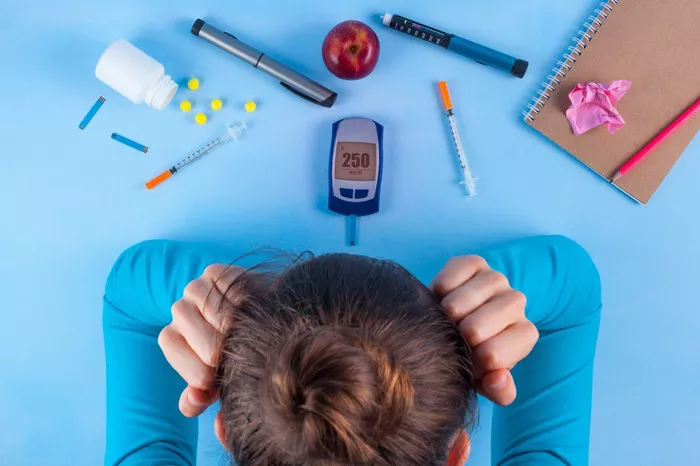In the realm of diabetes, there’s a pervasive belief that consuming excessive amounts of sugar directly leads to the development of diabetes.
This notion has been widely circulated, leading many to question whether their sweet tooth could be the culprit behind their diabetes diagnosis.
In this article, I’m going to explain the relationship between sugar consumption and diabetes, debunk common myths, delve into the complexities of this multifactorial condition, and provide evidence-based insights into its causes and risk factors.
Understanding Diabetes:
Before we delve into the sugar debate, it’s essential to grasp the fundamentals of diabetes. Diabetes is a complex metabolic disorder characterized by high blood sugar levels (hyperglycemia) resulting from the body’s inability to produce or effectively use insulin, a hormone responsible for regulating blood sugar.
There are several types of diabetes, with type 1, type 2, and gestational diabetes being the most common forms. While each type has its unique underlying causes and risk factors, all share the common feature of impaired glucose metabolism.
Dispelling the Sugar Myth:
Contrary to popular belief, consuming too much sugar alone does not directly cause diabetes. While a diet high in sugar can contribute to weight gain, obesity, and metabolic disturbances, including insulin resistance, it’s just one piece of the puzzle in the complex web of factors that contribute to diabetes development.
In fact, research suggests that excessive sugar intake is more strongly linked to the development of obesity and metabolic syndrome rather than directly causing diabetes.
Type 1 Diabetes:
Type 1 diabetes, previously known as juvenile diabetes or insulin-dependent diabetes, is an autoimmune condition in which the immune system mistakenly attacks and destroys the insulin-producing beta cells in the pancreas.
While the exact cause of type 1 diabetes remains unknown, genetic predisposition and environmental factors, such as viral infections, are believed to play a significant role. Sugar consumption does not trigger the autoimmune response that leads to type 1 diabetes.
Type 2 Diabetes:
Type 2 diabetes, the most common form of diabetes, is characterized by insulin resistance, where the body’s cells become less responsive to insulin’s effects.
While genetics and family history play a significant role in type 2 diabetes risk, lifestyle factors such as poor diet, sedentary lifestyle, obesity, and excess body fat, particularly visceral fat around the abdomen, are key contributors.
While high sugar intake may exacerbate insulin resistance and weight gain, it’s not the sole cause of type 2 diabetes.
Gestational Diabetes:
Gestational diabetes occurs during pregnancy and is characterized by high blood sugar levels that develop or are first recognized during pregnancy. Hormonal changes, insulin resistance, and genetic factors contribute to the development of gestational diabetes.
While excessive sugar consumption during pregnancy may increase the risk of gestational diabetes, it’s just one of many factors that can influence its development.
The Role of Sugar in Diabetes:
While sugar consumption alone may not directly cause diabetes, it can play a contributing role in the development of certain risk factors associated with the condition.
Excessive sugar intake can lead to weight gain, obesity, insulin resistance, and metabolic disturbances, all of which are significant risk factors for type 2 diabetes.
Additionally, a diet high in sugary beverages, refined carbohydrates, and processed foods can lead to fluctuations in blood sugar levels and contribute to poor glycemic control in individuals with diabetes.
Evidence-Based Insights:
Numerous studies have examined the relationship between sugar consumption and diabetes risk.
A comprehensive review published in the journal “Diabetologia” found that while high sugar intake is associated with an increased risk of obesity and metabolic syndrome, the evidence linking sugar consumption directly to diabetes risk is less clear.
Similarly, a study published in the “American Journal of Clinical Nutrition” concluded that while sugar-sweetened beverage consumption is associated with an increased risk of type 2 diabetes, the relationship is likely mediated by weight gain and obesity rather than sugar consumption alone.
Practical Recommendations:
While sugar consumption alone may not directly cause diabetes, it’s essential to practice moderation and make informed dietary choices to support overall health and well-being.
Aim to limit your intake of sugary beverages, sweets, desserts, and processed foods high in added sugars, and opt for whole, nutrient-dense foods such as fruits, vegetables, whole grains, lean proteins, and healthy fats.
Additionally, prioritize regular physical activity, weight management, and stress reduction to reduce your risk of developing diabetes and other chronic diseases.
Conclusion:
In conclusion, while consuming excessive amounts of sugar is not the sole cause of diabetes, it can contribute to the development of certain risk factors associated with the condition, such as obesity and insulin resistance.
Diabetes is a complex metabolic disorder influenced by a combination of genetic, environmental, and lifestyle factors.
Rather than scapegoating sugar as the primary culprit, it’s important to adopt a holistic approach to diabetes prevention and management, focusing on balanced nutrition, regular physical activity, and overall health promotion.
By making informed dietary choices and lifestyle modifications, you can reduce your risk of diabetes and improve your quality of life for years to come.



























